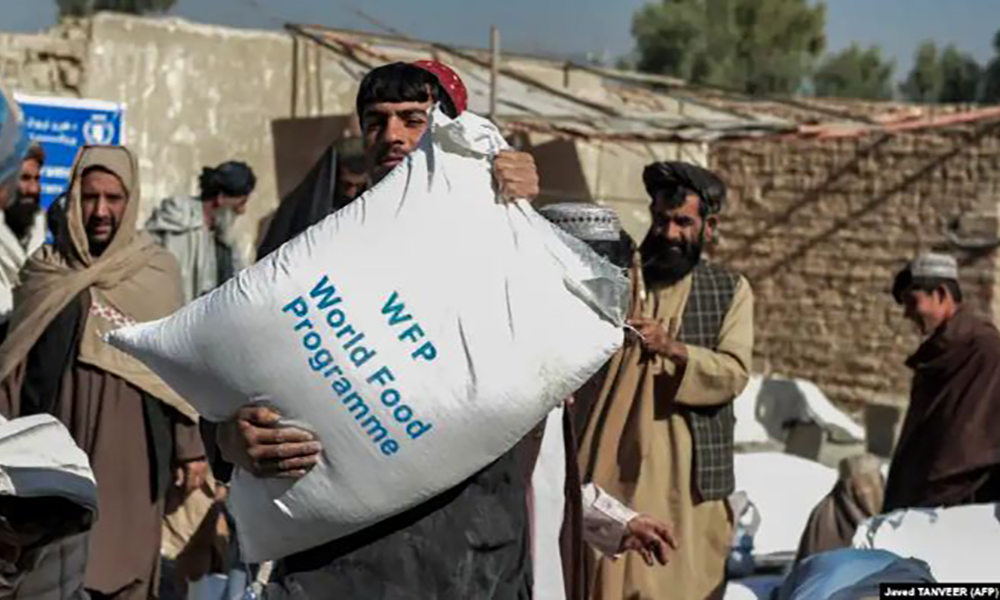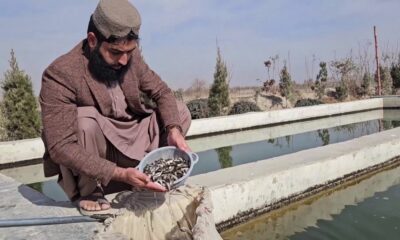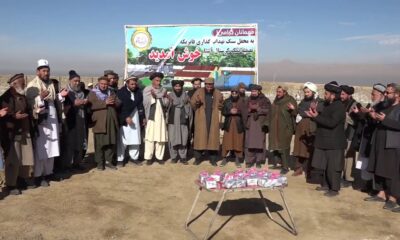Latest News
ADB throws WFP a lifeline of $100 million for critical food aid in Afghanistan

The United Nations World Food Programme (WFP) in Afghanistan has welcomed a contribution by the Asian Development Bank (ADB) of $100 million to help provide critical food assistance to more than 1.3 million people across the country.
A special focus will be on widow- and women-headed households and other highly vulnerable groups like people with disabilities or families surviving solely on begging. For many of these families, WFP has become their last lifeline.
“Afghanistan has faced an unprecedented humanitarian crisis compounded by climate change and intense droughts, floods, and earthquakes”, ADB said in a statement.
“Women and children are disproportionately affected with many women-led households suffering a lack of food and reduced access to services given women’s restrictions on movement outside their homes.”
With this contribution, WFP will also train food-insecure women on marketable and entrepreneurial skills and alternative livelihoods along the agricultural value chain, such as fruit and vegetable processing.
During the training, they will be supported with monthly cash transfers, while improving their long-term livelihoods and ability to stand on their own feet and buy food for their families thanks to their new skills.
“This contribution comes at a critical moment for Afghanistan, where 15 million people are going hungry and WFP only can still support three million people with emergency food assistance due to a massive funding crisis”, said Hsiao-Wei Lee, Country Director of WFP Afghanistan.
“We are grateful for this generous contribution from the Asian Development Bank that will help us reach families in need starting before winter, when hunger bites hardest.”
This is the second contribution from ADB to WFP in Afghanistan, following $135 million in the past year which put it amongst the top five contributors. This year, ADB is the biggest partner of WFP, to date.
Latest News
Iran will use ‘all means’ to restore water rights from Afghanistan

Iran’s foreign ministry said on Monday Tehran will use all means to restore its water rights from Afghanistan and that the Islamic Emirate should take the issue seriously.
Ismail Baqaei, the spokesman for the foreign ministry, said in response to a question at a press conference on the construction of water dams in Afghanistan, that Tehran has been following the issue closely for some time now and has lodged objections to the issue of dams being built in Afghanistan, IRNA news agency reported.
“It is clear that the waters that have flowed from Afghanistan to Iran for thousands or millions of years create rights for parties on both sides of the border,” Baqaei said, adding that there is a specific agreement in this regard.
"We will use all means to restore rights in this regard," he added.
The official also said that Iran’s acting ambassador in Kabul is following up on the issue of water rights.
The issue of water rights has been a source of tension between Afghanistan and Iran over the past few years.
Recently, Fida Hossein Maliki, a member of Iran’s parliament, expressed concern about the construction of water dams in Afghanistan and said that this issue is questionable.
He said that the current rulers of Afghanistan are treating neighboring countries, including Iran, in a way that has not been seen in the past.
The Islamic Emirate has repeatedly emphasized that it is committed to ensuring Iran's rights in accordance with the 1973 treaty, but Iran must also consider that the country is dealing with a drought.
Baqaei’s comments on Monday, follow close on the heels of his remarks Friday when he underscored the critical need for cooperation between Iran and Afghanistan to maintain the natural flow of water in shared border rivers.
He also noted Iran’s long-standing role in hosting millions of Afghan nationals over the past five decades. These enduring ties, he said, underscore the importance of mutual respect and collaboration in addressing shared challenges.
On Friday, Baqaei called on Afghanistan to respect these rights and cooperate in ensuring the continued flow of water.
"The principle of good neighborliness should guide our efforts," Baqaei stated, adding that equitable use of shared water resources is essential for the well-being of both nations.
Recently, Afghanistan's rulers announced they had begun filling the Pashdan Dam, located near Herat on the Harirud River.
The development adds to long-standing disputes over the Helmand River, which dates back to the 19th century.
Although a 1939 treaty was drafted to address water sharing, it was never ratified by Afghanistan, leading to protracted disputes.
In 1973, the two nations agreed that Afghanistan would allow a flow of 26 cubic meters per second—equivalent to 820 million cubic meters annually—into Iran.
Latest News
India condemns Pakistani airstrikes on Afghanistan

India’s Ministry of External Affairs on Monday condemned Pakistan's recent airstrikes on Afghanistan, which caused civilian casualties.
“We have noted the media reports on airstrikes on Afghan civilians including women and children, in which several precious lives have been lost,” Indian foreign ministry spokesperson Randhir Jaiswal said in a statement.
“We unequivocally condemn any attack on innocent civilians. It is an old practice of Pakistan to blame its neighbours for its own internal failures. We have also noted the response of an Afghan spokesperson in this regard,” he added.
Nearly two weeks ago, bombardment by Pakistani military aircraft in Afghanistan's eastern Paktika province killed at least 46 people, most of whom were children and women.
The Islamic Emirate said it retaliated targeting several points across the Durand Line.
Latest News
Kandahar farmers replace poppies with pistachios
Some farmers in Kandahar said however that establishing a pistachio orchard was costly and urged the Islamic Emirate government to assist them.

Farmers in Afghanistan’s southern province of Kandahar have taken a solid step towards replacing poppy fields with pistachio plantations.
Local officials said that so far, 115 tons of pistachios have been harvested from 150 hectares of cultivated land.
They said pistachio farming is proving to be an effective alternative to poppies and that the local government is trying hard to encourage farmers to plant pistachio trees.
Most pistachio production occurs in countries with arid climates.
Turkey, Iran, Italy, and Syria are the principal pistachio producing countries, outside the United States and pistachio nuts are grown mainly for export in those countries.
Trees are also grown in Pakistan, Greece, India, and Australia.
According to some local farmers, they tend their pistachio orchards daily and employ between 30 and 60 workers.
Some farmers in Kandahar said however that establishing a pistachio orchard was costly and urged the Islamic Emirate government to assist them.
Officials from Kandahar’s Department of Agriculture, Irrigation and Livestock said pistachio farming was a good alternative to poppy cultivation. They in turn called on former poppy farmers to consider planting pistachio trees.
Pistachio trees can live up to 300 years, but they take five to seven years to begin producing nuts.
They are alternate-bearing, meaning that the harvest is heavier in some years than others.
Peak production is reached around 20 years.
-

 Latest News5 days ago
Latest News5 days agoMinistry: $1 billion invested in Afghanistan’s poultry production sector
-

 Latest News5 days ago
Latest News5 days agoDeclining water levels affect 50 percent of fish farms in Kandahar
-

 World5 days ago
World5 days agoUS vet formerly deployed in Afghanistan rams truck into New Orleans crowd, killing 15
-

 Latest News4 days ago
Latest News4 days agoSalt refinery plant to be built in Takhar province
-

 Sport5 days ago
Sport5 days agoAfghanistan set for second test against Zimbabwe in Bulawayo
-

 Latest News5 days ago
Latest News5 days agoHostility towards Afghans has spread to Pakistani Pashtuns: Gandapur
-

 Tahawol4 days ago
Tahawol4 days agoTahawol: IEA’s response to accusations of Pakistan
-

 Regional5 days ago
Regional5 days agoPalestinian Authority suspends broadcast of Qatar’s Al Jazeera TV temporarily
























